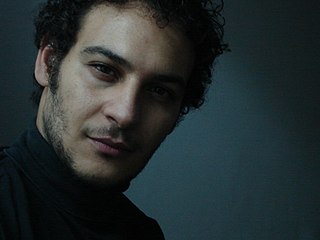Related Research Articles
Zakaria Tamer, also spelled Zakariya Tamir, is a Syrian short story writer. He is one of the most widely read and translated short story writers of modern Syrian literature, as well as one of the foremost authors of children’s stories in Arabic. He also worked as a freelance journalist, writing satirical columns in Arabic newspapers.

Alaa Al Aswany is an Egyptian writer, novelist, and a founding member of the political movement Kefaya.
Sudanese literature consists of both oral as well as written works of fiction and nonfiction that were created during the cultural history of today's Republic of the Sudan. This includes the territory of what was once Anglo-Egyptian Sudan, the independent country's history since 1956 as well as its changing geographical scope in the 21st century.

Muhammad Aladdin, also known as Alaa Eddin is an Egyptian novelist, short story writer, and script writer. His first collection of short stories was published in 2003, and he is the author of five novels—The Gospel According to Adam, The Twenty-Second Day, The Idol (novel), The Foot (novel), and A Well-Trained Stray—and four short story collections—The Other Shore, The Secret Life of Citizen M, Young Lover, New Lover, and The Season of Migration to Arkidea.

Ihsan Abdel Quddous was an Egyptian writer, novelist, and journalist and editor in Egypt's Al Akhbar and Al-Ahram newspapers. He wrote many novels that were adapted into films, and served as editor for many years of the literary journal Rose al-Yūsuf.

Egyptian literature traces its beginnings to ancient Egypt and is some of the earliest known literature. Ancient Egyptians were the first to develop written literature, as inscriptions or in collections of papyrus, precursors to the modern book.
Ahmad Abdel Rahman Al-Khamisi is an Egyptian writer and journalist.
Libyan literature has its roots in Antiquity, but contemporary Libyan writing draws on a variety of influences.
Wajdi al-Ahdal is a Yemeni novelist, short story writer and playwright. Laureate of the International Prize for Arabic Fiction (IPAF) in 2008, is known for his contemporary literary style and sometimes socially critical works, some of which have been censored in Yemen. Until 2019, he has published five novels, four collections of short stories, a play and a film screenplay.
Nadia Al-Kokabany is a Yemeni novelist, short story writer and academic. She was born in Taiz and studied architecture at Sanaa University. She completed a PhD in architecture at Cairo University in 2008, before returning to take up an academic position at Sanaa University.
Ahmad Mahfuz Umar was a Yemeni writer. Born in Aden, he was considered to be one of the pioneering figures of modern Yemeni literature and was a co-founder of the Yemeni Writers' Union. At an early age, he won a short story competition organised by the journal Al-Nahdah with his story Murdi'at al-atfal (1956). His stories often deal with life in the big city and similar gritty themes. He published several collections of short fiction, including Al-indhar al-mumazzaq (1960), Al-agras al-samita (1974), Ya ahl hadha al-jabal (1978) and Al-nab al-azraq (1980).
Abdallah Abbas Al-Iryani is a Yemeni novelist and writer. He studied at Cairo University, obtaining a degree in civil engineering in 1984. He has devoted himself more seriously to literature since 2005. He has published several novels and short story collections as well as a play. His work has been translated into Italian and was included in a 2009 anthology on Yemeni literature called Perle dello Yemen.
Abdallah Salim Bawazir was a renowned Yemeni novelist, short story writer, columnist and author. He was born in the town of Ghayl Bawazir in Hadhramaut province. He finished his formal schooling at the age of 16 and, due to his family's poverty, went off to Aden in search of work. He worked there for several years in various commercial stores before returning to Hadhramaut in 1962. However his stay in Mukalla, the capital of Hadhramaut, proved short-lived and he went back to Aden in 1963, working as manager of a well-known commercial store for the next 33 years. In 1997, he tried one more time to settle down in Mukalla but this attempt too proved unsuccessful. He went back to Aden for the last time to live out the final years of his life.
Mayfa' Abdel Rahman al-Qiyadi was a Yemeni short story writer and journalist. He studied at the Gorky Institute in Moscow and obtained an MA in 1982. He is known for his short stories which explore the social and political realities of Yemen. His first collection of short stories appeared in 1975, followed by a second one in 1983. His work has appeared in English translation in a 1988 anthology called The Literature of Modern Arabia.
Muhammad al-Gharbi Amran is a Yemeni short story writer, novelist and politician. He is known for his short stories and for his controversial novel Mushaf Ahmar. He is also a former deputy mayor of Sanaa.
Yasir Abdel Baqi is a Yemeni novelist, screenwriter, journalist and author. He was born in Aden and studied history and antiquities at university. His first book of short stories was called Ahlam (Dreams) followed by a collection called Night Woman. His controversial novel Zahavar appeared in 2008.
Muhammad Abdallah Muthanna is a Yemeni novelist, playwright and short story writer.
Ibrahim Aslan was an Egyptian novelist and short story writer.
Mohammad Abdul-Wali was a Yemeni diplomat and a prominent writer of Yemeni-Ethiopian descent.
Safa Abdel Moneim is an Egyptian writer, novelist, educator and a researcher in folk literature. She is born in 1960. She has published nine short story collections and twelve novels. Among her most prominent works are Within the Spirit's Beauty, a novel written in colloquial Egyptian Arabic which has been translated to English and Italian, and the short-story collection At Night When He Left . She also has several studies published in various newspapers and magazines. Her most recent published novel is My Granny Apple.